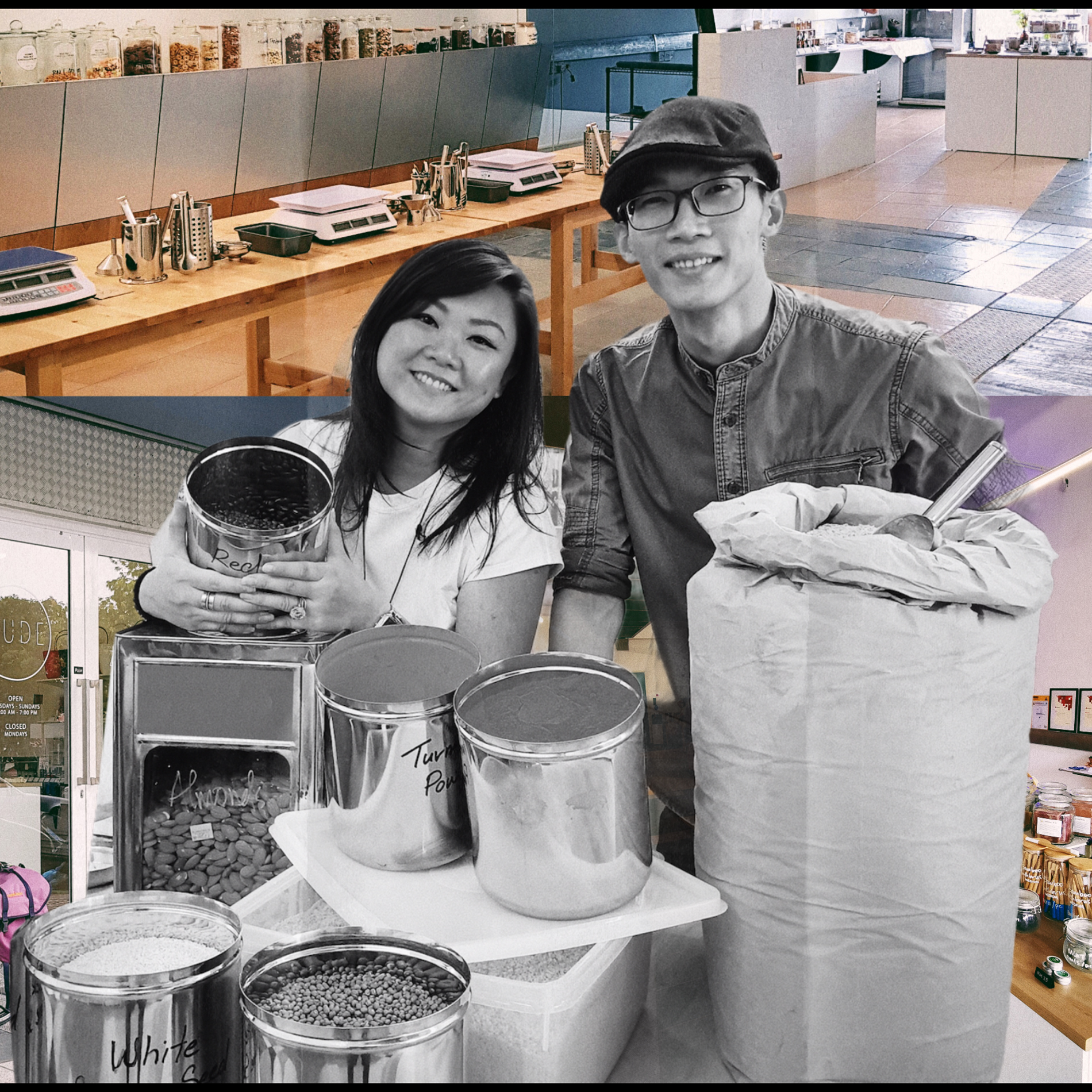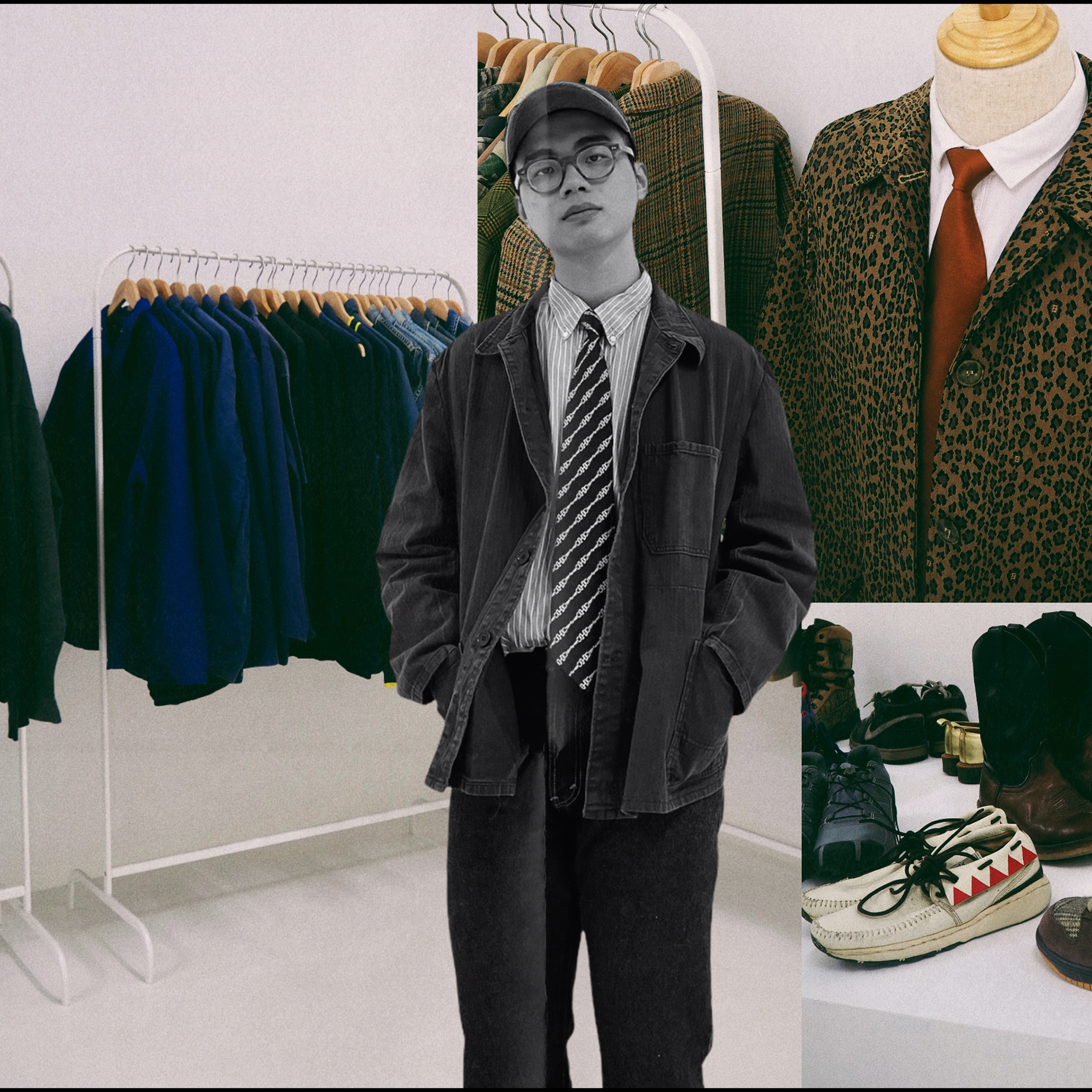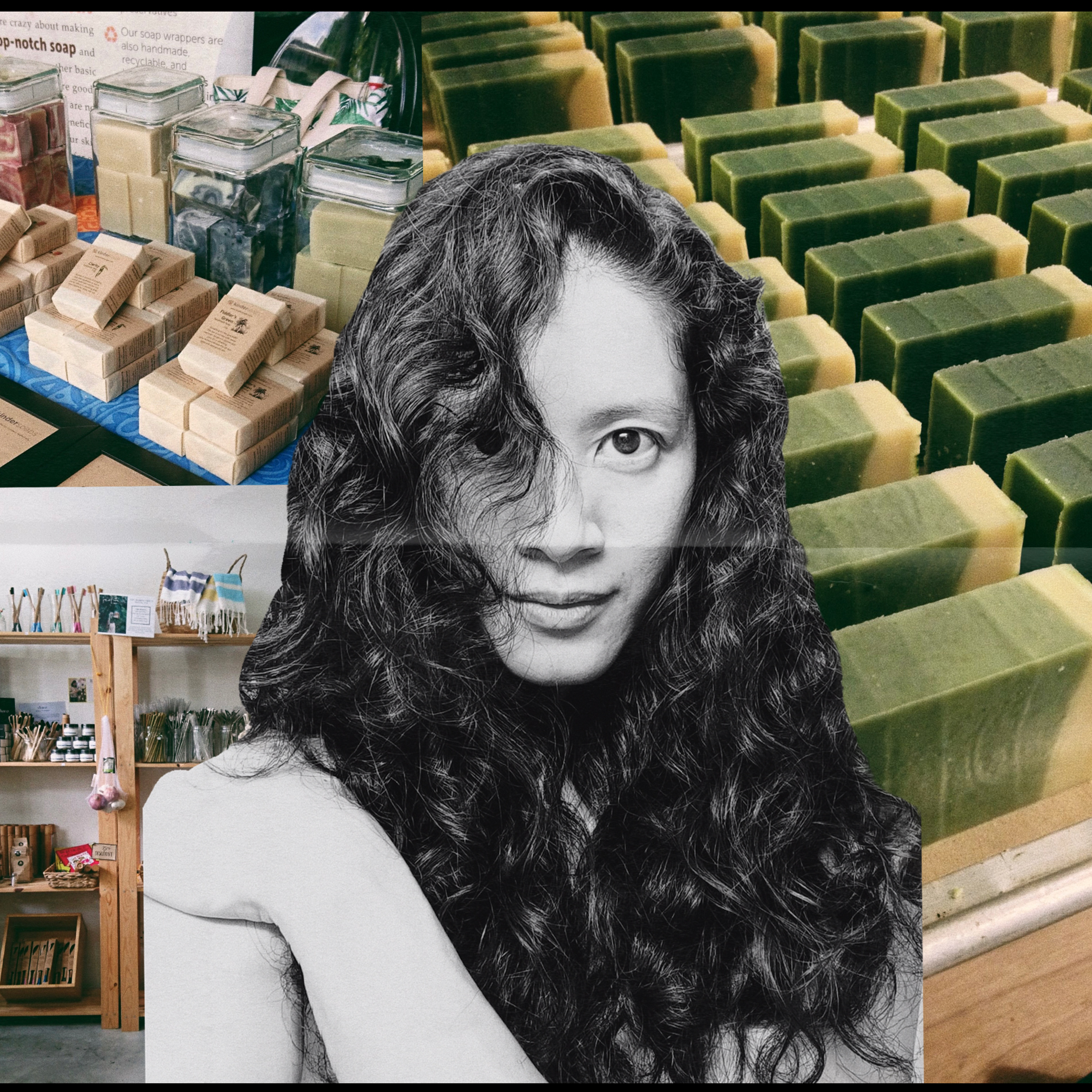The zero-waste revolution is not just a saying, take a look at these pioneers who are facing the challenge head-on.
Nude The Zero Waste Store (@nudezerowaste) by Chery Anne Low and Wilson Chin

A substantial zero-waste shop that’s more than just a grocer – that’s what Nude: The Zero Waste Store is all about in a nutshell. Offering eco-friendly alternatives to everyday essential items, the grocery store located at the heart of Petaling Jaya, and masterminded by Cheryl and Wilson is also a one-stop hub that offers visitors information about zero waste and resource conservation.
How does Nude work?
We offer a wide range of daily essentials items such as foods, drinks and detergents to wellness and skincare products like essential oils to households and all-natural insect repellents, that price at 10 to 15% lower compared to any supermarkets. We sell them by weight and customers are encouraged to bring their own containers and bags when they come.
Why is Petaling Jaya the right spot for Nude The Zero Waste store?
We saw a great opportunity in PJ because previously, there was no such thing as zero-waste shop around this area, and we thought Nude might be a great idea to introduce to the community about the reused and recycled lifestyle.
How do you source the items you sell at your store?
The sourcing practices are discussed with our suppliers before we proceed with the purchase. We need to know that the whole process involved in producing the items – from the supply chain to ingredients to packaging – and which products can be repacked in materials other than plastic. We try to source our products locally and work alongside other small businesses that share our passion.
After a few years of operation, do you see a change of thinking among Malaysians on bulk foods and packaging-free products? What motivates people here to adopt the approach?
Absolutely! Although it’s not drastic, we find that our society are starting to become more aware on the items they buy. They’re starting to read the labels! They’re also more sensitive to not only plastic, but also the carbon footprint that comes along with a product. Our customers prefer this shopping approach because they feel responsible to every action they take towards the environment and they want to avoid from being wasteful as much as possible.
There are people who find it hard to practice zero-waste shopping. Why is that so?
When it comes to practicing healthy shopping habits, we found most people do not know how or where to begin with. Some even feel the concept to be intimidating, as if they have to go completely zero waste. The thing is it all starts with your mindset. It can be daunting and challenging in the beginning, like everything else, but as long as the motivation is intact, the habit will eventually form and we just stick to it. The easiest way to start is by bringing your own reusable bag whenever you go shopping.
How long do you think will it take for Malaysia to transition and operate on a zero-waste supply chain?
We’re very far away from achieving that. The nation needs to have a stronghold love towards the environment, then everything can operate with nature consciousness in mind. It will happen but it will require time, effort and the right mindset.
Temporary (@temporary_jb) by Jakkie Tay

Started off as a hobby, Jakkie began thrifting at the age of 13. Little did he know, he would open his own curated second-hand clothing store in his early 20s, which specialises in vintage and rare-find fashion items. Today, this most fashionable thrift boutique in Johor Bahru is one of the go-to places for fashion goers and collectors in search of that classic Fendi or vintage Burberry.
When sourcing items for Temporary, where and what do you look at?
The items are usually sourced from local or overseas thrift stores, and resellers or marketplaces I find on the internet. I always look out for items that I personally would wear, and of course they have to be in good and sellable condition. Other things that I would consider are the year of manufacture as well as the brand.
What’s the most common misconception people have on buying second-hand items?
That second-hand items are not worth the money. It can be true but if you know how to style and work around your clothes, you won’t see any difference compared to the brand-new ones.
What would you do with items that don’t sell?
I usually will advertise them on social media for last resort before they got reworked or up-cycled as new pieces.
What would you say is your greatest find to date?
There are a lot but the greatest find I’ve had so far is a vintage Fendi leopard print trench coat. Hit our website or Instagram to check it out!
Tell us about your recent released – TEMPORARY is LOVE is TEMPORARY. How did the idea come about?
It’s a collaborative work between me with a few of my friends who share the same passion. It’s an exclusive collection where we reworked 10 selected second-hand pieces and added a custom print on each of them. The objective is to reach a wider audience, especially in these testing times.
Your online aesthetic is also pretty appealing. Are you in charge of the design of your social media, website and lookbook?
Yes. Temporary is my brainchild and I want to be involved in every part of it, especially the website and social media where we interact with our customers the most.
How has your own sense of fashion style changed over the years?
When I was younger, I would say my style was bold. I always had a few statement pieces on me like vibrant coloured shoes, a Sukajan jacket or some quirky trousers. As I started working in the fashion business, now, my style has changed in a more relaxed, 90s inspired and practical.
What are your tips for those just starting to get into thrift shopping?
Buy what you really like and do not waste money on something that you yourself aren’t going to wear.
Lastly, what are your plans for the business?
At Temporary, we are trying to make it more than just a thrift store. We want it to be a place where people can feel inspired when they visit – either the physical store or the digital platform. We also have plenty of interesting stuff coming up, so stay tuned.
Kindersoaps (@kindersoaps) by Michelle Ho

When investing in your skin, explore the idea of buying skincare from zero-waste stores. This is the main tip by Michelle – the mastermind behind her mindful, all-natural, waste-free beauty and well-being label, Kindersoaps – on how to become a conscious consumer that encourages changes in the beauty industry. Being in the field for more than a decade, the brand is growing bigger than ever with more product lines releasing this year.
What’s your wellness philosophy?
Better skin doesn’t have to cost the earth. We emphasise respecting your skin, and our earth by creating high quality products without superfluous ingredients, or product packaging.
Kindersoaps is known for its arrays of natural and soothing soap bars. Can you tell us more about them?
Firstly, they are self-preserving, and self-cleaning. Next, all natural soap bars that are made from scratch depend on this chemical called sodium hydroxide. It is a strong alkali which, when used in properly formulated soap, is completely used up during the process of making soap, called saponification. Last but not least, just because a soap or skincare item is touted to be made entirely of natural ingredients, it doesn’t mean that it is necessarily safe, or better for the skin. Natural things can be poisonous too. Soap bars need to be formulated in a safe manner, with a strong understanding of the raw materials used.
How does Kindersoaps practice the zero-waste system?
We reuse shipping material that we receive from our customers, as well as from our own shipments that we receive from vendors, and our soap bars are available packaging-free. The wrappers are made in-house using cotton muslin fabric, infused with beeswax and resins. These are reusable, and we encourage our customers to return them to us so we can clean and reuse them for new soap bars. Other than that, we also accept our Double Duty Balm tins to be returned to us in good, usable condition, so we can reuse them for fresh batches in the future. Also, the run-offs from our soap bars are grey water safe – run offs from using our soap bars do not contain any additives that are known to harm aquatic life, so you can use them by rivers and oceans safely.
If you had to choose one, which is your absolute favourite Kindersoaps product – and why?
That would be our shampoo bar, The Mane Event. Firstly, it’s a hit amongst our customers for keeping their hair glossy, healthy and free from all the usual additives that you find in commercially produced shampoos. Secondly, it does away with the need for plastic bottles, which liquid shampoos typically come packaged in. Thirdly, I love that it works perfectly fine as a cleanser from top to toe, including for your face.
What is your ultimate goal for Kindersoaps?
For the first time in years, we’re aiming to launch a few new products. I can’t reveal much more than that for now, but I am truly excited about the impact these items can have on the lives of people who may benefit from them. I still think we need to do more in terms of figuring out how to reduce our reliance on packaging materials, or at least find partners to work with who will give us the assurance that the waste that we produce is actually recycled, repurposed or reused. And I’d like for us to use our social media platform as a way to raise awareness about the various environmental conservation efforts happening around Malaysia – I don’t know enough about them just yet, and I’d like for all of us to learn together.
This story first appeared in the June/July 2021 issue of Men’s Folio Malaysia.